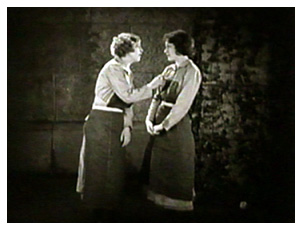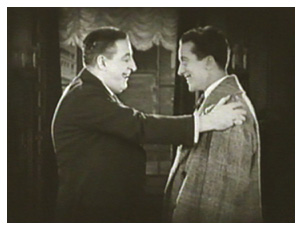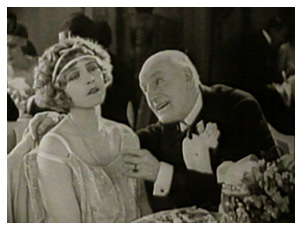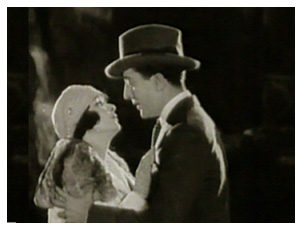

Directed by Frank Lloyd
Produced by Joseph N. Schenck Productions
Distributed by First National Pictures
Cast: Norma Talmadge (Mary Turner), Lew Cody (Joe Garson), Jack Mulhall (Richard Gilder), Eileen Percy (Aggie Lynch), Joseph Kilgour (Edward Gilder), Arthur C. Hull (Demarest), Helen Ferguson (Helen Morris), Lincoln Plummer (Cassidy), Thomas Ricketts (General Hastings), Ward Crane (English Eddie), DeWitt Jennings (Burke), Lionel Belmore (Irwin), Eddie Boland (Darcy)
Mary Turner, a salesgirl at Gilder's Emporium in New York, is in jail, charged with stealing from her employer. Goods were found in her locker incriminating her, although she repeatedly insists she is innocent. Although leniency has been recommended by the jury, Gilder insists that it is the court's "duty" to punish such acts. Mary is sentenced to three years in prison but vows to make Gilder pay for every minute she spends there.
Upon being released from prison, her record keeps her from finding employment, and she decides to end her misfortune by jumping in the river. Con man Joe Garson sees her, rescues her and takes her to a friend's apartment - Aggie Lynch. Coincidentally, Aggie was Mary's best friend in prison.
Conceding that it is impossible to "go straight,"
she agrees to go into the con game with Joe and Aggie but insists
they will do it "within the law." 
A year later, we see the three of them living in a large, expensive apartment with fine clothes - all the result of earnings from breach of promise suits involving Aggie and old men. Their latest conquest, the elderly General Hastings, is enamored of Aggie. During one evening out, Hastings introduces Mary to Richard Gilder, son of the man who was responsible for sending her to prison. A relationship develops, and the two begin seeing each other on a regular basis. In the meantime, however, Hastings ends up paying a large sum of money to retrieve a bundle of incriminating letters he has written to Aggie. By this time, the police are beginning to look closely at Mary's activities - although she has yet to do anything "outside the law."
One day, Joe brings home English Eddie who says he has a "job" that will net them a half million dollars - stealing some Gothic tapestries from the Gilder home - tapestries Eddie says were stolen from France. Mary tells Joe they will not do anything that is "outside the law and to forget this proposition."
When Gilder learns of his son's involvement with Mary, he goes with Inspector Burke and Detective Cassidy to Mary's apartment to ask what amount of money it will take to buy her off. At this point, he does not remember her as the girl who once worked for him. Richard arrives - not realizing what is taking place - and announces that he and Mary were married that morning. Mary then tells Gilder who she is - adding that he has just begun to pay her back for those years in prison.
A variety of complications compose the remainder of the story as Richard questions whether Mary married him for love or revenge, Joe decides to join Eddie in stealing the tapestries which also draws Mary into a situation that could send her back to prison, and a murder that leads Inspector Burke to question Mary, Joe and Richard as suspects.
"Within the Law" is a melodrama; however, without seeing the film, one should not form any preconceived notions that the story is outdated or overly sentimental. Norma Talmadge succeeds in seasoning the well-worn story with a twenties flavor aided by some savory supporting performances.
The film is based on a popular stage play by Bayard Veiller that first appeared in Chicago in 1912 with no success. Later, with producers including Archibald and Edgar Selwyn and Lee Shubert, as well as the famous Jane Cowl in the lead, the New York run of the play became a major hit. In the mid-teens, young women were trying to look and talk like Jane Cowl, and as many as nine companies were on tour with the play, including one in London.
 The play's previous success no
doubt provided anticipation of the film version (there had been
an earlier version with Agnes Ayres that left little impression);
however, it must have also given Talmadge a high standard to attain
which she did admirably. As mentioned, the story is a melodrama,
but Talmadge keeps the melodramatics in check and never reaches
beyond believability or allows the story to slip into over-sentimentality.
The play's previous success no
doubt provided anticipation of the film version (there had been
an earlier version with Agnes Ayres that left little impression);
however, it must have also given Talmadge a high standard to attain
which she did admirably. As mentioned, the story is a melodrama,
but Talmadge keeps the melodramatics in check and never reaches
beyond believability or allows the story to slip into over-sentimentality.
As the film opens, we see her in a cell. She's defeated, broken, to be pitied. She has been wrongly accused, and no one will believe her innocence. "I am innocent. I never committed a dishonest act in my life," she tells the judge. Nevertheless, the wealthy emporium owner, Edward Gilder, apparently has influence with the judge as he asserts, "Property rights must be protected, your Honor. We cannot allow sympathy for a criminal to turn us from our duty."
Social commentary is not absent from the film, either, as the aforementioned scene attests. It is further emphasized when Gilder allows the wife of a wealthy banker to go free after she is caught shoplifting, even apologizing on behalf of the store - this scene taking place after we have seen him show no mercy or compassion toward Mary. To further comment on the "privileged wealthy" and the downtrodden working class, we are shown a scene in which Mary asks to speak to Gilder in his office before being taken to prison. Handcuffed to a detective, she pleads with Gilder to treat his employers more fairly. "They want decent food and warm clothes - a little happiness - the things they cannot get honestly and decently with the wages you pay them." When her pleas are ignored and she is waved away by Gilder, we suddenly see the defeated and broken shop girl become a spirited, defiant individual. "You are sending me to prison for three years," she tells him. "When I come out, you are going to pay me for every minute I have lost. You are going to pay me - and pay - and pay."
A short sequence toward the end of Mary's term in prison serves little purpose other than to introduce Aggie Lynch who has befriended Mary. As the two are talking, Mary is pampering a flower she has planted when an amazon of a woman comes by and purposely steps on it. Mary and the woman end up on the ground fighting as the scene fades. We expect to see some punishment given to Mary such as her release being delayed, but there is no other mention of the incident. Why a scene that has no bearing on the remainder of the story was included is puzzling.
Out of jail, Mary is unable to overcome her past and find work, so, true to what we would expect in a melodrama, she goes to the wharf, looks down at the water and jumps in. Con man Joe Garson rescues her and takes her to a friend's apartment, who, coincidentally, happens to be Aggie Lynch. As she recovers, Aggie tries to convince Mary to join them in their petty con activities; however, Mary insists she is going straight. Some time later, she reads a column in the newspaper that reinforces what she has experienced - that the "law today is the rich man's law." Finally convinced, she agrees to join them, but she insists, "I intend to use the methods employed by the unscrupulous rich - in other words, I will always keep within the law."
Norma Talmadge's films were always first-rate. With husband Joe Schenck behind her, quality personnel were assured such as director Frank Lloyd and France Marion as scenarist. "Within the Law" derives much of its success, though, from the supporting cast - essentially all players performing to perfection.
Eileen Percy is probably best remembered for her appearances
in four early Douglas Fairbanks films, including "Wild and
Woolly" (1917) and "Reaching for the Moon" (1917).
However, she  portrays the quintessential flapper
with sparkle and sprightliness. A running gag in the film has
her character very innocently bat her eyes and say, "Oh,
I'm so fwightened!" Two of the scenes in which she uses this
line are particularly worth mentioning.
portrays the quintessential flapper
with sparkle and sprightliness. A running gag in the film has
her character very innocently bat her eyes and say, "Oh,
I'm so fwightened!" Two of the scenes in which she uses this
line are particularly worth mentioning.
Scene 1: After falling for Aggie and "courting" her for a period of time, General Hastings (described as "not a day over eighty") finally finds himself paying off Aggie to regain several "compromising" letters he wrote to her. As Hastings stands looking out the window, both hurt and indignant, two lawyers exchange letters for money and then pass the money over to Aggie. With the loot in hand, Aggie walks over to Hastings, who refuses to turn and face her, and mockingly says, "Oh, I'm so fwightened!" Then she "gootches" him with her elbow - making the old man jump - and laughs as she walks away.
Scene 2: In another scene at the police station, Inspector Burke is bringing in all parties - one at a time - to question them about English Eddie's murder. When Aggie comes in, she, of course, says, "Oh, I'm so fwightened!" adding, "And to be arrested by a common policeman! What would my papa think!" Burke asks who is her father, and she gives him the name of a wealthy railroad president. Believing her, Burke changes his demeanor, suggests that she not tell anyone about this, and escorts her to the door. (more social commentary?) Unfortunately, Detective Cassidy, who knows Aggie well, comes in the door at that very moment. Realizing "the jig is up," Aggie puts her hands on her hips, smacks her gum and says, "Now ain't that the cat's whiskers!" The viewer will find Percy's performance a superb tour de force, as did many reviewers at the time. Variety (May 3, 1923) said, "Eileen Percy is admirable as Aggie Lynch." Picture Play's (August 1923) reviewer was obviously taken with Percy's work, exclaiming, "Eileen Percy . . . makes the hit of her life as Aggie Lynch. I always have considered Miss Percy as just another one of those blond actresses, but in 'Within the Law' she shines forth as an excellence comedienne."
Lew Cody, who may be best remembered in straightforward "bad guy" roles, is given more depth to his character - and delivers. Cody's character, Joe Garson, is the third member of Mary's group, yet we are never really told what his role may be in their "game." It is important to the story, though, that his character is obviously in love with Mary. Although we realize this in a couple of scenes where he looks very hurt when Richard and Mary are together, there is one scene that played excellently to emphasize his feelings.
Detective Cassidy arrives at the apartment just as Mary is leaving to meet Richard for a date. She leaves, but he remains to question Aggie and Joe. Cassidy, determined to catch Mary doing something wrong, exclaims, "As for that Turner dame, I'll . . . " - and before he can finish the sentence, Joe flares up and angrily raises his fist at Cassidy. Unflinchingly, the detective asks, "What's the matter, Joe? Not stuck on her, are you?" At that, Joe shouts at him to "Get out!" Although not covered in this commentary, a viewing of the film will - at a later point - show the importance of establishing Joe's affection for Mary.
This scene does have a humorous moment that provides another "classic" performance by Percy and some clever title-writing. Before the angry confrontation with Joe, Cassidy vigorously questions Aggie. Maintaining her innocent act, Aggie twists back and forth and says, "But, Mr. Cassidy! We haven't broken the law!" then, as if she has "re-thought" her response, adds, "Well, maybe we bent it a little," and bats her eyes.
Cody, not known for outstanding work, possibly gives one of his best performances in "Within the Law." One must agree with The New York Times reviewer (May 7, 1923) who said, "Lew Cody has seldom acted as well as he does as the sympathetic crook, Joe Garson."
While all of this is taking place, Mary's relationship with
Richard Gilder is blossoming. Mulhall does a fine job as the wealthy
young man who has fallen in love and wants to marry Mary. Later
in the film he is given the opportunity for
a greater range of emotion. One of those opportunities is when
he hears Mary vow revenge on his father. Having only been married
a few hours, Mulhall effectively conveys hurt and puzzlement.
He is obviously hurt by the confrontation between Mary and his
father, but he also loves her and questions whether he is being
used for revenge against his father or if Mary truly loves him.
Another opportunity for more depth of character comes when he
must defend himself from a murder charge and protect Mary at the
same time. Mulhall was praised by the critics, too, with Variety
venerating, "Jack Mulhall was all that could be desired as
the younger Gilder."
the film he is given the opportunity for
a greater range of emotion. One of those opportunities is when
he hears Mary vow revenge on his father. Having only been married
a few hours, Mulhall effectively conveys hurt and puzzlement.
He is obviously hurt by the confrontation between Mary and his
father, but he also loves her and questions whether he is being
used for revenge against his father or if Mary truly loves him.
Another opportunity for more depth of character comes when he
must defend himself from a murder charge and protect Mary at the
same time. Mulhall was praised by the critics, too, with Variety
venerating, "Jack Mulhall was all that could be desired as
the younger Gilder."
Lincoln Plummer, the "second banana" cop, Cassidy, is perfect as the detective who barges into the apartment tossing about threats of how he's going to catch them one day but is forever frustrated because he never can. To his credit, he portrays the harried detective well - even taking his hat off and crushing it back on his head in his frustration - but never essaying the clichéd bungling cop.
DeWitt Jennings, as Cassidy's boss, Inspector Burke, played the same part on the stage, so he obviously came into the film knowing the character well - and it shows. The New York Times reviewer said Jennings "seems to have all the dramatic details at his fingers' ends." He is a tough cop, patient and meticulous - and sufficiently intimidating as he interrogates all of the suspects in the murder of English Eddie.
Ward Crane deserves kudos as English Eddie. With the Brilliantine hair and continental moustache, he is suave and debonair yet, at the same time, devious. Without giving away too much of the ending, let's just say Eddie's deceitfulness is found out - and the transformation from confidence to concern as he watches the others turn on him is a fine bit of acting by Crane.
Of course, Norma Talmadge is the centerpiece around which all of this admirable support revolves. She is the star, and Talmadge has the indescribable star quality that holds our attention throughout the length of the film. From the frightened, pitiable, plain shop girl to the elegant, confident and self-sufficient socialite, Talmadge moves from one portrayal to the next with ease. We enjoy Talmadge the most in this film, though, when she displays a determined fieriness. As when she is being taken away to prison and tells Gilder that he will pay for every minute she spend behind bars - we don't doubt her determination and anxiously anticipate how she will exact her revenge. When she has married Richard, we delight in the confrontation with Gilder as she reveals to him that she is the girl he sent to prison several years ago. Moving closer to his face with an intense demeanor, she says, "You owe me for all that, and I have just begun to collect!" She adds, "Four years ago you took away my name and gave me a number. Now, I've given up that number and taken your name." It's very easy to envision a 1923 audience applauding or cheering as this scene takes place.
No one - with the possible exception of Garbo - could exude a coolness better than Talmadge, either. As Burke questions her about the murder of English Eddie, he tries to entice her with a letter he has in is possession that would clear her name of the theft for which she was accused. She doesn't raise an eyebrow. Then, as he leans across the desk to assure her that her confession of who killed Eddie would be kept in confidence, she smugly gets up, walks to a large barred window that is hidden behind window shades. Calmly, she raises one of the shades to reveal a stenographer on the other side of the barred window who is transcribing their entire conversation - so much for Burke's claim of "confidential."
Harrison's Reports (May 5, 1923) said, "(The movie) gives Miss Talmadge the best dramatic opportunity she has had recently; her work is magnificent." Variety said, "Norma Talmadge is a particularly effective Mary Turner," and The New York Times said, "Frank Lloyd's direction, coupled with the acting of Norma Talmadge and a strong supporting cast, make it a picture worth seeing." Picture Play added its praise. "Norma herself plays the role of Mary Turner with ease, assurance, and something of the sympathy that Jane Cowl brought to the part when she appeared in it on the stage."
Interestingly, with almost universal praise for Talmadge's acting, Photoplay (July 1923) seemed to stand as the one dissenter. "This production of Bayard Veiller's melodrama has everything save inspiration. . . the melodrama lacks something vital. We put this to Norma Talmadge's playing of Mary Turner. Miss Talmadg seems afraid to act, no an uncommon ailment these days among our starts. There is hardly a suggestion of the emotional Mary Turner of the stage originator, Jane Cowl."
It is a credit to the film that it picks up speed as it moves along (as any good film should). Although there is some predictability to it, the story becomes more involved as English Eddie enters the picture. Lew Cody's character takes on a more important role, as well, and all that Mary has worked for is suddenly threatened by events that are not "within the law." There are enough twists and turns to keep the story from being too predictable, though, and the resolution, although not a completely happy one, leaves the viewer feeling satisfied that he or she has enjoyed a great story.
Kino's DVD of "Within the Law" is coupled with
a more famous Norma Talmadge feature, "Kiki" (1926),
yet, if "Within the Law" had been released as a single,
it would still be worth the price of the DVD. Kino deserves continued
kudos for the high standards they maintain for their releases.
The film quality is excellent with only minor deterioration of
the source print evident toward the end. The simple piano score
by Makia Matsumura is inspired and beautiful.
Copyright 2010 by Tim Lussier. All rights reserved